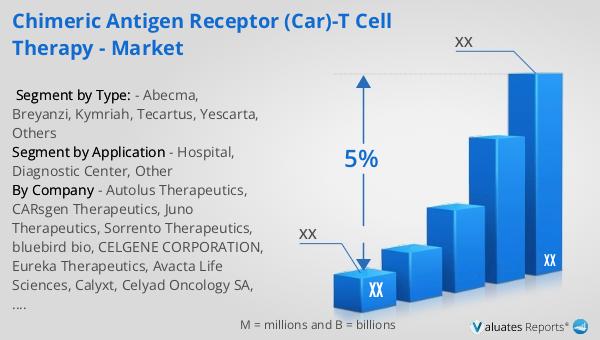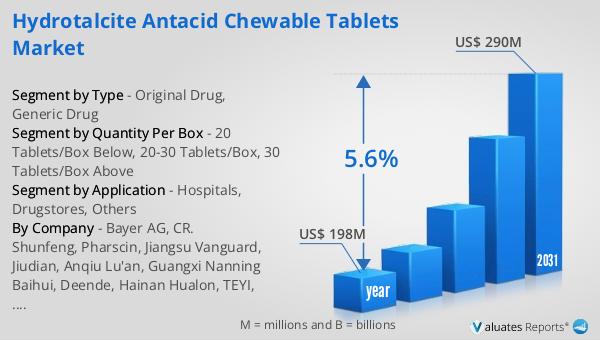What is Chimeric Antigen Receptor (CAR)-T Cell Therapy - Global Market?
Chimeric Antigen Receptor (CAR)-T Cell Therapy is a groundbreaking advancement in the field of cancer treatment, representing a significant shift in how we approach the fight against cancer. This therapy involves the genetic modification of a patient's T cells, a type of white blood cell, to better recognize and attack cancer cells. The process begins with the extraction of T cells from the patient, which are then engineered in a laboratory to express chimeric antigen receptors (CARs) on their surface. These receptors are designed to specifically target antigens present on the surface of cancer cells. Once the T cells are modified, they are infused back into the patient, where they seek out and destroy cancer cells. This personalized approach has shown remarkable success in treating certain types of blood cancers, such as leukemia and lymphoma, offering hope to patients who have not responded to traditional treatments. The global market for CAR-T cell therapy is rapidly expanding as more therapies are developed and approved, driven by the increasing prevalence of cancer and the demand for more effective treatments. As research continues, CAR-T cell therapy holds the potential to revolutionize cancer care and improve patient outcomes worldwide.

Abecma, Breyanzi, Kymriah, Tecartus, Yescarta, Others in the Chimeric Antigen Receptor (CAR)-T Cell Therapy - Global Market:
Abecma, Breyanzi, Kymriah, Tecartus, and Yescarta are among the leading CAR-T cell therapies currently available in the global market, each offering unique benefits and targeting specific types of cancer. Abecma, developed by Bristol Myers Squibb and bluebird bio, is the first CAR-T cell therapy approved for the treatment of multiple myeloma, a type of blood cancer. It targets the B-cell maturation antigen (BCMA) on myeloma cells, providing a new treatment option for patients who have exhausted other therapies. Breyanzi, also from Bristol Myers Squibb, is approved for the treatment of certain types of large B-cell lymphoma. It targets the CD19 antigen on cancer cells, offering a personalized treatment approach for patients with relapsed or refractory disease. Kymriah, developed by Novartis, was the first CAR-T cell therapy approved by the FDA and is used to treat acute lymphoblastic leukemia (ALL) in children and young adults, as well as certain types of large B-cell lymphoma in adults. It also targets the CD19 antigen, providing a powerful tool in the fight against these aggressive cancers. Tecartus, from Kite Pharma, a Gilead company, is approved for the treatment of mantle cell lymphoma, a rare and aggressive form of non-Hodgkin lymphoma. Like Kymriah and Breyanzi, Tecartus targets the CD19 antigen, offering hope to patients with limited treatment options. Yescarta, also developed by Kite Pharma, is approved for the treatment of large B-cell lymphoma and follicular lymphoma. It targets the CD19 antigen and has shown significant efficacy in clinical trials, leading to its approval in multiple countries. These therapies represent a new era in cancer treatment, offering personalized and targeted approaches that have the potential to improve outcomes for patients with difficult-to-treat cancers. As the global market for CAR-T cell therapy continues to grow, ongoing research and development efforts are focused on expanding the range of cancers that can be treated with these innovative therapies, improving their safety and efficacy, and making them more accessible to patients worldwide.
Hospital, Diagnostic Center, Other in the Chimeric Antigen Receptor (CAR)-T Cell Therapy - Global Market:
The usage of Chimeric Antigen Receptor (CAR)-T Cell Therapy in hospitals, diagnostic centers, and other healthcare settings is transforming the landscape of cancer treatment. In hospitals, CAR-T cell therapy is typically administered in specialized oncology units equipped to handle the complex process of cell extraction, modification, and reinfusion. The therapy requires close monitoring of patients for potential side effects, such as cytokine release syndrome and neurotoxicity, which necessitates a multidisciplinary team of healthcare professionals, including oncologists, hematologists, and nurses. Hospitals play a crucial role in the delivery of CAR-T cell therapy, providing the infrastructure and expertise needed to ensure safe and effective treatment. Diagnostic centers are also integral to the CAR-T cell therapy process, as they are responsible for identifying patients who are eligible for the treatment. This involves advanced diagnostic testing to determine the presence of specific cancer antigens that can be targeted by CAR-T cells. Diagnostic centers work closely with hospitals and research institutions to ensure that patients receive timely and accurate diagnoses, enabling them to access CAR-T cell therapy when appropriate. In addition to hospitals and diagnostic centers, other healthcare settings, such as research institutions and biotechnology companies, are involved in the development and refinement of CAR-T cell therapies. These organizations conduct clinical trials to evaluate the safety and efficacy of new CAR-T cell products, contributing to the growing body of evidence supporting their use in cancer treatment. As the global market for CAR-T cell therapy expands, collaboration between hospitals, diagnostic centers, and other healthcare settings will be essential to ensure that patients benefit from these innovative treatments. By working together, these institutions can help overcome the challenges associated with CAR-T cell therapy, such as high costs and limited availability, ultimately improving access to this life-saving treatment for patients around the world.
Chimeric Antigen Receptor (CAR)-T Cell Therapy - Global Market Outlook:
The outlook for the Chimeric Antigen Receptor (CAR)-T Cell Therapy market is promising, particularly when viewed within the broader context of the global pharmaceutical industry. In 2022, the global pharmaceutical market was valued at approximately 1,475 billion USD, with an expected compound annual growth rate (CAGR) of 5% over the next six years. This growth is indicative of the increasing demand for innovative therapies and the continuous advancements in medical research and development. In comparison, the chemical drug market has seen a steady increase, growing from 1,005 billion USD in 2018 to an estimated 1,094 billion USD in 2022. This growth reflects the ongoing need for traditional pharmaceuticals alongside the emergence of novel treatments like CAR-T cell therapy. The CAR-T cell therapy market is poised to benefit from these trends, as it represents a cutting-edge approach to cancer treatment that aligns with the broader industry shift towards personalized medicine. As more CAR-T cell therapies receive regulatory approval and become available to patients, the market is expected to expand, driven by the increasing prevalence of cancer and the demand for more effective and targeted treatments. The collaboration between pharmaceutical companies, research institutions, and healthcare providers will be crucial in overcoming the challenges associated with CAR-T cell therapy, such as high costs and complex manufacturing processes, to ensure that patients worldwide can access these life-saving treatments. By leveraging the growth of the global pharmaceutical market, the CAR-T cell therapy market has the potential to revolutionize cancer care and improve patient outcomes on a global scale.
| Report Metric | Details |
| Report Name | Chimeric Antigen Receptor (CAR)-T Cell Therapy - Market |
| CAGR | 5% |
| Segment by Type: |
|
| Segment by Application |
|
| By Region |
|
| By Company | Autolus Therapeutics, CARsgen Therapeutics, Juno Therapeutics, Sorrento Therapeutics, bluebird bio, CELGENE CORPORATION, Eureka Therapeutics, Avacta Life Sciences, Calyxt, Celyad Oncology SA, Fortress Biotech, IMMUNE THERAPEUTICS, Gilead Sciences, Novartis AG, Alaunos Therapeutics, Poseida Therapeutics |
| Forecast units | USD million in value |
| Report coverage | Revenue and volume forecast, company share, competitive landscape, growth factors and trends |
